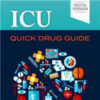Neuromuscular Blockade for ARDS Was No Help, In Supine Patients
pulmccm.orgContinuous neuromuscular blockade for severe ARDS became common practice after the ACURASYS trial showed it reduced mortality by an absolute 9%. A larger trial, ROSE, now finds no benefit of the therapy over usual care, but leaves lingering questions due to major design differences. The ROSE trial was a multicenter randomized trial in which 1,066 patients with ARDS received either early 48-hour infusions of cisatracurium and deep sedation, or usual care (it was not blinded; the control patients did not receive placebo). Patients in the usual care arm could get as-needed doses of cisatracurium (and 17% did), but were kept to the lightest sedation possible in accordance with current standard practice. Results were published in the New England Journal of Medicine and reported at a society conference.

















